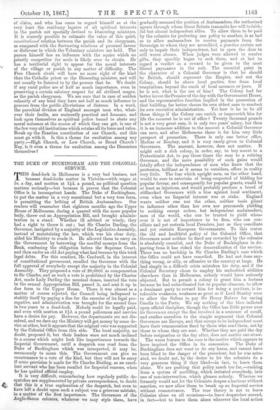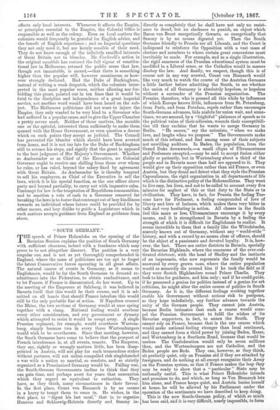THE DUKE OF BITCH - INGHAM AND THE COLONIAL
SERVICE.
rrITIS dead-lock in Melbourne is a very bad busines, not 1 because dead-locks matter in Victoria—with wages at 5s. a day, and mutton at lid. a pound, no political question matters seriously—but because it proves that the Colonial Office is in incompetent hands. The Duke of Buckingham, to put the matter in a very sensational but a very true form, is permitting the bribing of British Ambassadors. Our readers will remember that eighteen months ago the Upper House of Melbourne, during a quarrel with the more popular body, threw oat an Appropriation Bill, and brought adminis- tration to a stand. 'Whether ill advised or wisely, they had a. right to throw it out ; but Sir Charles Darling, the Governor, instigated by a majority of the Legislative Assembly, instead of maintaining the law, which was his clear duty, aided his Ministry to evade it. He allowed them to carry on the Government by borrowing the needful moneys from the Bank, confessing the obligation before the Supreme Court, and then under an old Act paying what had become by this trick legal debts. For this conduct, Mr. Cardwell, in the interest Of constitutional govenment, recalled the Governor with the tun approval of everybody except the majority in the Colonial Assembly. They proposed a vote of 20,0001. as compensation to Sir Charles, and as such a vote is prohibited by the Charter Act, made Lady Darling the nominal donee, inserted the vote in the annual Appropriation Bill, passed it, and sent it up in due form to the Upper House. There it was almost as a Matter of course rejected, the Council being indisposed to stultify itself by paying a fine for the exercise of its legal pre- rogative, and administration was brought for the second time in two years to a dead-lock. Nobody could be legally paid, and even with mutton at lid. a pound policemen and navvies have a desire for pay. However, the departments are not dis- solved, and we dare say the Ministry will get money by some de- -Vice or other, but it appears that the original vote was supported by the Colonial Office from this side. The local majority, no doubt, proposed it, but their leaders were not much inclined to a. -course which might look like impertinence towards the Imperial Government, until a despatch was read from the Duke of Buckingham which was interpreted, it may be, erroneously to mean this. The Government can give no countenance to a vote of the kind, but they will not be sorry if some provision is made for Sir Charles Darling, as an excel- lent servant who has been recalled for Imperial reasons, when he has quitted official employ.
It is very difficult, remembering how regularly public de- spatches are supplemented by private correspondence, to doubt that this is a true explanation of the despatch, but even to have left a doubt upon such a subject was a grievous mistake, in a matter of the first importance. The Governors of the Anglo-Saxon colonies, whatever we may style them, have
gradually assumed the position of Ambassadors, the authorized agents through whom Great Britain transmits her will to faith- ful but almost independent allies. To allow them to be paid by the colonies for preferring one policy to another, is as bad as to allow ambassadors to receive payments from the Sovereign to whom they are accredited, a practice certain not only to impair their independence, but to open the door to still worse abuses. When judges were allowed to receive gifts, they speedily began to seek them, and at last to regard a verdict as a reward to be given to the most liberal paymaster in the suit. The essential point in the character of a Colonial Governor is that he should be British, should represent the Empire, and not the Colony,. should be above local parties, free from local temptations, beyond the reach of local menaces or jeers. If he is not, what is the use of him I The Colony had far better invest thePremier of the day with the Government House, and the representative function implied in the possession of that building, far better choose its own ablest man to conduct its own executive administration. Yet how is he to be all these things if the Colony can enrich or impoverish him for life the moment he is out of office ? Twenty thousand pounds is not a very great sum, it is only two years' salary, but then it is an immense addition to the amount a Colonial Governor can save, and after Melbourne there is for him very little prospect of promotion. There is only one better office, Madras or Bombay, and it is very rarely given to Colonial Governors. The amount, however, does not matter. It might suit a rich colony, in order, say, to buy assent to a Protectionist Act, to pay three times the sum to a retiring Governor, and the mere possibility of such gains would fatally affect the independence of men who know that the profession, brilliant as it seems to outsiders, offers in reality very little. The fear which upright men, on the other hand, would be sure to entertain of being suspected of bidding for popular favour, and consequently for popular grants, would be at least as injurious, and would probably produce a breed of stiffnecked Governors with a bias against local sentiment, even when no Imperial interest was at stake. England wants neither one nor the other, neither tools pliant to influence other than her own nor proconsuls yielding to nothing except orders, but independent ambassadors, men of the world, who can be trusted to yield when- ever it is not of importance to be firm, who can con- ciliate and yet restrain local Premiers, just as they conciliate and yet restrain European Governments. To this status the old and healthful policy of the Colonial Office, that Governors must neither be fined nor rewarded by the colonies is absolutely essential, and the Duke of Buckingham in de- parting from it has risked the demoralization of the service. There was no hardship in Sir Charles Darling's case which the Office could not have remedied. He had not done any- thing wrong, or silly, or offensive to the country at large. He had simply in a difficult crisis mistaken his duty, and if the Colonial Secretary chose to employ his undoubted abilities elsewhere than in Melbourne, nobody would have seriously objected. But to permit a colony to grant him a fortune because he had subordinated law to popular clamour, to allow a dominant party to reward him for being a partizan, is in- tolerable weakness, weakness as great as if Lord Stanley were to allow the Sultan to pay Sir Henry Bulwer for saving Candia to the Porte. We say nothing of the blow inflicted upon official discipline, though the Office has little power over its Governors except the fine involved in a sentence of recall, and confine ourselves to the simple argument that Colonial Governors are Envoys, and that envoys to be independent must have their remuneration fixed by those who send them, not by those to whom they are sent. Whether they are paid the day before resignation or the day after, does not matter one straw.
The worst feature in the case is the motive which appears to have inspired the Office in its concession. The Duke of Buckingham does not want to do any harm, and cannot have been blind to the danger of the precedent, but he was actu- ated, we doubt not, by the desire to let the colonists do a very generous thing if they liked—in fact, to leave them alone. We are pushing that policy much too far,—rushing from a system of meddling, which irritated everybody, into one of non-intervention, which pleases nobody. Whereas we formerly would not.let the Colonists deepen a harbour without sanction, we now allow them to break up an Imperial service without remonstrance. The true theory is not to leave Colonies alone on all occasions—to leave despatches unread, in fact—but to leave them alone wherever the local action affects only local interests. Whenever it affects the Empire, or principles essential to the Empire, the Colonial Office is responsible as well as the colony. Even on local matters the colonists would frequently be grateful for English advice, and the benefit of English experience ; and on Imperial questions they not only need it, but are keenly sensible of their need. They do not know enough of the infinitely ramified interests of Great Britain not to blunder. Mr. Cardwell's action in the original squabble has restored the full vigour of constitu- tional law in Melbourne, retoned the public sense that law, though not immutable, is sacred,—that there is something higher than the popular will, however unanimous, or how- ever strongly declared. Had the Duke of Buckingham, instead of writing a weak despatch, which the colonists inter- preted in the most popular sense, neither allowing nor for- bidding this grant, pointed out in ten lines that it would he fatal to the discipline and independence of a great imperial service, not another word would have been heard on the sub- ject. The Melbourne politicians did not want to injure the Empire, they only wanted to be very kind to a Governor who had suffered in a popular cause, and to give the Upper Chamber a pretty severe snub. Neither of those motives, the amiable one or the spiteful, interested them sufficiently to make them quarrel with the Home Government, or even question a decree which on such points they accept as judicial. The Council has prevented the blunder which should have been averted from home, and it is not too late for the Duke of Buckingham still to retrace his steps, and signify that the grant is opposed to the best judgment of Her Majesty's Government. Whether as Ambassador or as Chief of the Executive, no Colonial Governor ought to receive one shilling from those over whom he rules, or has ruled, beyond the salary fixed by agreement with Great Britain. As Ambassador he is thereby tempted to sell his employers, as Chief of the Executive to sell the laws, which it is his special function, as the one officer above party and beyond partiality, to carry out with impassive calm. Contempt for law is the temptation of Republican communities, and to sanction a vote of cash to a Governor removed for breaking the laws is to foster that contempt out of lazy kindliness towards an individual whose future could be provided for by other means, and lazy dislike to guide a Legislature which in such matters accepts guidance from England as guidance from above.































 Previous page
Previous page